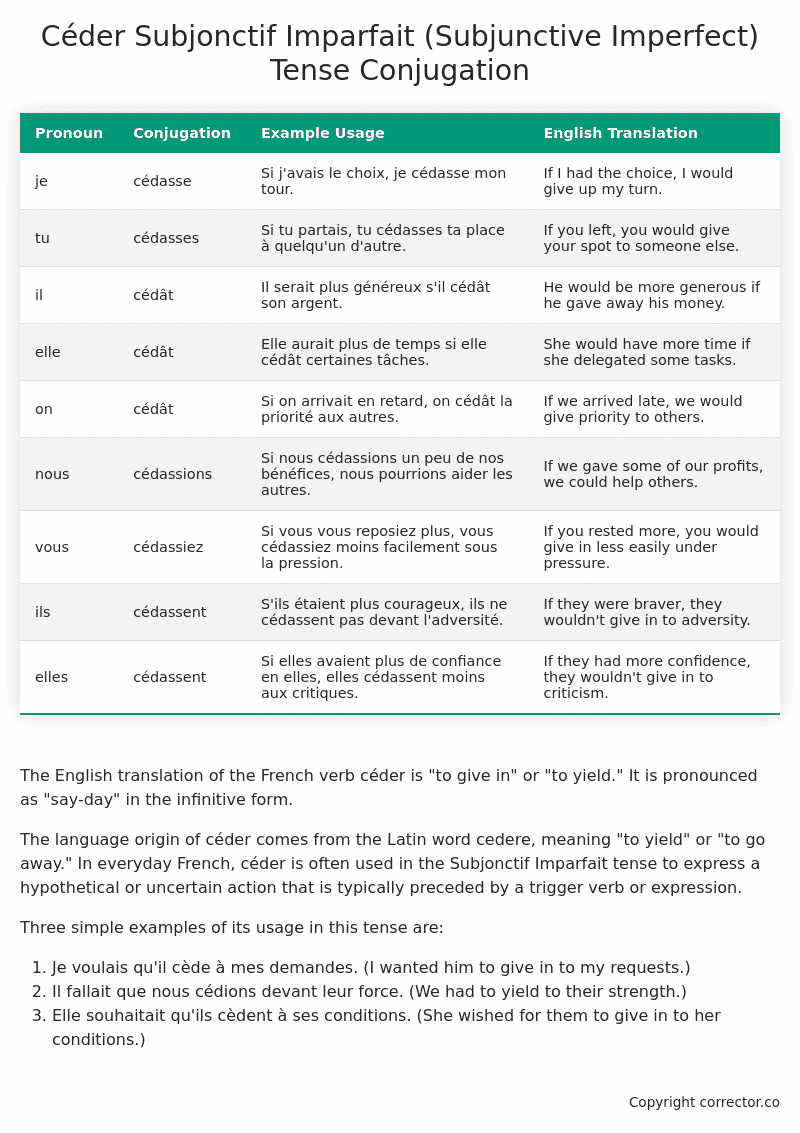Subjonctif Imparfait (Subjunctive Imperfect) Tense Conjugation of the French Verb céder
Introduction to the verb céder
The English translation of the French verb céder is “to give in” or “to yield.” It is pronounced as “say-day” in the infinitive form.
The language origin of céder comes from the Latin word cedere, meaning “to yield” or “to go away.” In everyday French, céder is often used in the Subjonctif Imparfait tense to express a hypothetical or uncertain action that is typically preceded by a trigger verb or expression.
Three simple examples of its usage in this tense are:
- Je voulais qu’il cède à mes demandes. (I wanted him to give in to my requests.)
- Il fallait que nous cédions devant leur force. (We had to yield to their strength.)
- Elle souhaitait qu’ils cèdent à ses conditions. (She wished for them to give in to her conditions.)
Table of the Subjonctif Imparfait (Subjunctive Imperfect) Tense Conjugation of céder
| Pronoun | Conjugation | Example Usage | English Translation |
|---|---|---|---|
| je | cédasse | Si j’avais le choix, je cédasse mon tour. | If I had the choice, I would give up my turn. |
| tu | cédasses | Si tu partais, tu cédasses ta place à quelqu’un d’autre. | If you left, you would give your spot to someone else. |
| il | cédât | Il serait plus généreux s’il cédât son argent. | He would be more generous if he gave away his money. |
| elle | cédât | Elle aurait plus de temps si elle cédât certaines tâches. | She would have more time if she delegated some tasks. |
| on | cédât | Si on arrivait en retard, on cédât la priorité aux autres. | If we arrived late, we would give priority to others. |
| nous | cédassions | Si nous cédassions un peu de nos bénéfices, nous pourrions aider les autres. | If we gave some of our profits, we could help others. |
| vous | cédassiez | Si vous vous reposiez plus, vous cédassiez moins facilement sous la pression. | If you rested more, you would give in less easily under pressure. |
| ils | cédassent | S’ils étaient plus courageux, ils ne cédassent pas devant l’adversité. | If they were braver, they wouldn’t give in to adversity. |
| elles | cédassent | Si elles avaient plus de confiance en elles, elles cédassent moins aux critiques. | If they had more confidence, they wouldn’t give in to criticism. |
Other Conjugations for Céder.
Le Present (Present Tense) Conjugation of the French Verb céder
Imparfait (Imperfect) Tense Conjugation of the French Verb céder
Passé Simple (Simple Past) Tense Conjugation of the French Verb céder
Passé Composé (Present Perfect) Tense Conjugation of the French Verb céder
Futur Simple (Simple Future) Tense Conjugation of the French Verb céder
Futur Proche (Near Future) Tense Conjugation of the French Verb céder
Plus-que-parfait (Pluperfect) Tense Conjugation of the French Verb céder
Passé Antérieur (Past Anterior) Tense Conjugation of the French Verb céder
Futur Antérieur (Future Anterior) Tense Conjugation of the French Verb céder
Subjonctif Présent (Subjunctive Present) Tense Conjugation of the French Verb céder
Subjonctif Passé (Subjunctive Past) Tense Conjugation of the French Verb céder
Subjonctif Imparfait (Subjunctive Imperfect) Tense Conjugation of the French Verb céder (this article)
Subjonctif Plus-que-parfait (Subjunctive Pluperfect) Tense Conjugation of the French Verb céder
Conditionnel Présent (Conditional Present) Tense Conjugation of the French Verb céder
Conditionnel Passé (Conditional Past) Tense Conjugation of the French Verb céder
L’impératif Présent (Imperative Present) Tense Conjugation of the French Verb céder
L’infinitif Présent (Infinitive Present) Tense Conjugation of the French Verb céder
Struggling with French verbs or the language in general? Why not use our free French Grammar Checker – no registration required!
Get a FREE Download Study Sheet of this Conjugation 🔥
Simply right click the image below, click “save image” and get your free reference for the céder Subjonctif Imparfait tense conjugation!

Céder – About the French Subjonctif Imparfait (Subjunctive Imperfect) Tense
Formation
Common Everyday Usage Patterns
Interactions with Other Tenses
Subjonctif Présent
Indicatif Passé Composé
Conditional
Conditional Perfect
Summary
I hope you enjoyed this article on the verb céder. Still in a learning mood? Check out another TOTALLY random French verb conjugation!


